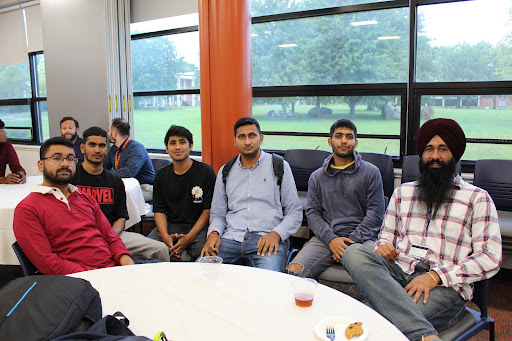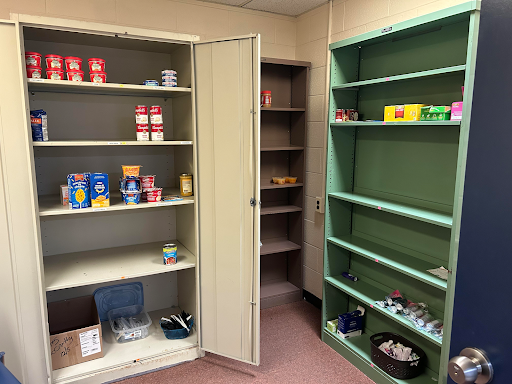
Utica University welcomed 745 incoming students this semester. Among the newly enrolled students, 72 were international students which brought in new backgrounds and cultures to the campus.
Director of Academic Business Development Elizabeth Nassar said the increase is the result of a tri-fold strategy to increase international enrollments.
Utica used educational consultants to increase the quality of applicants, strongly emphasized graduate programs, specifically the MBA program and worked one-on-one with students to prepare them for visa interviews.
The university’s visa approval rate has increased almost 20% worldwide over the last year which has helped boost its global presence.
Studying overseas is a big investment considering international students receive little to no financial assistance nor have the opportunity to earn money in the U.S., Nassar said. The application process itself can take several months.
Once students find a university with their program, the university works with students on obtaining proper documentation and meets virtually with students to prepare them for the interview process.
Nassar said after COVID, international education became more interesting to people from abroad.
“I think that international students in general, whether they’re scholars, whether they’re undergrads, whether they’re graduate students, really understand the value proposition of Utica University in a way that they might not have a couple years ago,” Nassar said.
Why international students choose Utica
Cost, quality of faculty, the ability to do Curriculum Practical Training or Optional Practical Training and being close to New York City and Boston are several of the benefits, Nassar said.
Anjli Sharma, a graduate student from India, has studied at Utica for three semesters. Prior to applying for grad school, she worked as a subject matter expert for British Telecoms in India for six years. Most international students enrolled in the MBA program have an average of five years work experience.
Being overseas brings employment challenges as most students are limited in the amount of hours they are allowed to work. Some campus jobs can be filled with only Federal Work Study students.
Student Zill Bhavsar from India says there is competition for jobs among international students.
“They don’t have enough jobs for us, because most jobs they give to students who are citizens here,” Bhavsar said.
She said professors have been really helpful being references as they look for work, but in addition to campus having limited job availability, they have the added challenge of lacking transportation to get to work.
“Utica is very car-centric and the transportation system is very bad,” Bhavsar said. “I would recommend them to consider us for campus jobs because we are a lot of international students and jobs are very less and provide us with shuttle services too, to downtown and stores, and not just to downtown classes.”
Sharma was accepted to three universities but chose Utica because she was looking for an in-person experience. Among her options were a university in Boston and a university in San Francisco, but Utica had the small town appeal. Sharma was looking for a walkable city where she could get to know the people in the community she would be a part of.
Assimilating into American culture is challenging
International Student Union President Mariami Kentchadze said one of the biggest challenges is culture shock. Kentchadze came to Utica from the Republic of Georgia right out of high school and is now a senior in the Cybersecurity program.
“It’s really hard to get used to societal norms and expectations,” Kentchadze said, “That people don’t talk about but expect of others because that’s the environment they grew up in. You restart your life from zero and you don’t know people. You have no ground to stand on.”
Kentchadze said all of the context one learns in their life in their country of origin, like which streets are safe at night, which cafes are good, which products and grocery stores work for you, are void because the context changes.
Many international students also find it more difficult to connect with their families at home due to time zone differences. Utica’s campus becomes a primary community for international students.
Sharma said from her first semester in spring 2023, faculty and staff have been flexible and accommodating with the technological adjustments she had to make as a student.
“Staff is actually very very understanding and take the time to make us understand things that we are not understanding,” Sharma said.
She spoke of Nurse Dawn DeGironimo at the Health Center who has helped international students with challenges they face while adjusting to a much colder climate than where they came from.
Although the majority of the campus supports the international community, Kentchadze said some campus offices have an expectation that international students should only be handled by the international students office. She said it would be better if offices worked together to support international and minority students on campus.
Students can support their International peers by connecting with them and keeping an open mind, according to Kentchadze.
“Don’t be annoyed when international students don’t have the context for something in American culture, clarify a little more,” Kentchadze said. “Be respectful about people’s speech and if they are mispronouncing things or don’t know a word, help them, help them and support them. Don’t have expectations that you would have for American peers, and give them time to adjust to their new life.”
Incoming students came from Afghanistan, Bangladesh, Bermuda, Canada, Cameroon, Ethiopia, Finland, Ghana, Hong Kong, India, Japan, Kenya, Lebanon, Malaysia, Myanmar, Nepal, Nigeria, Pakistan, Poland, Russia, Spain, Sweden and Wales.


















![President Todd Pfannestiel poses with Jeremy Thurston chairperson Board of Trustees [left] and former chairperson Robert Brvenik [right] after accepting the university's institutional charter.](https://uticatangerine.com/wp-content/uploads/2023/10/unnamed.jpeg)





















































































































